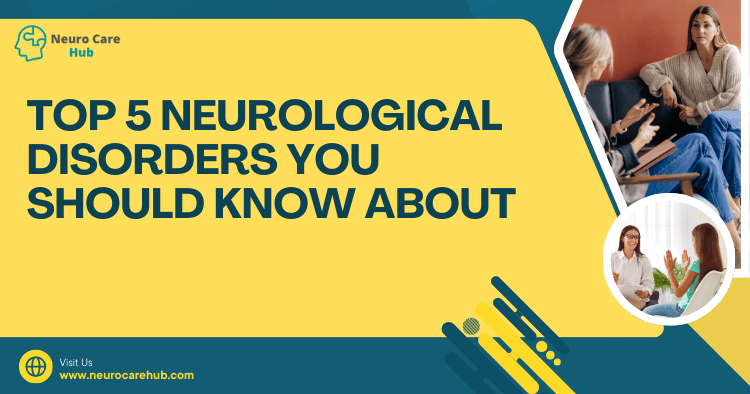Table of Contents
- Introduction
- 1. Alzheimer’s Disease
- 2. Parkinson’s Disease
- 3. Multiple Sclerosis
- 4. Epilepsy
- 5. Stroke
- FAQs
- Conclusion
Introduction
Neurological disorders are conditions that affect the nervous system, which includes the brain, spinal cord, and peripheral nerves. These disorders can be debilitating, leading to a range of symptoms from mild cognitive impairment to severe physical disabilities. With millions of people affected worldwide, understanding these disorders is essential for both those who suffer from them and their loved ones. In this article, we will explore five significant neurological disorders, providing insights into their symptoms, causes, and treatments. As we progress into 2024 and beyond, advancements in neuro care are expected to play a crucial role in managing these conditions effectively.
For insights on the evolving landscape of neuro care, check out our article on Top 5 Future Trends Shaping Neuro Care in 2024.
1. Alzheimer’s Disease
Alzheimer’s Disease is the most common form of dementia, characterized by a progressive decline in cognitive function. It primarily affects memory, thinking, and behavior. The exact cause of Alzheimer’s is not fully understood, but it is believed to involve a combination of genetic, environmental, and lifestyle factors.
Symptoms
- Memory loss, particularly recent memories
- Difficulty with problem-solving and planning
- Confusion about time and place
- Changes in mood and personality
Treatment
While there is currently no cure for Alzheimer’s, medications like Donepezil and Rivastigmine can help manage symptoms. Lifestyle changes, such as a healthy diet, regular exercise, and cognitive therapies, are also encouraged.
The emphasis on early intervention in neuro care is critical for conditions like Alzheimer’s, as outlined in our article on Top 5 Benefits of Early Intervention in Neuro Care.
For more detailed information, visit the Alzheimer’s Association.
2. Parkinson’s Disease
Parkinson’s Disease is a progressive neurological disorder that primarily affects movement. It occurs when nerve cells in the brain that produce dopamine begin to die. This lack of dopamine leads to the hallmark symptoms of Parkinson’s.
Symptoms
- Tremors or shaking, especially in the hands
- Stiffness or rigidity in the limbs
- Bradykinesia (slowness of movement)
- Impaired balance and coordination
Treatment
There is no cure for Parkinson’s, but treatments focus on managing symptoms. Medications like Levodopa can increase dopamine levels, while physical therapy can help improve mobility.
Caregivers can significantly enhance the effectiveness of neuro care for individuals with Parkinson’s, as discussed in our article on Top 5 Ways Caregivers Enhance Neuro Care Effectiveness.
For further insights, check out the Parkinson’s Foundation.
3. Multiple Sclerosis
Multiple Sclerosis (MS) is an autoimmune disease that affects the central nervous system, leading to communication problems between the brain and the rest of the body. The immune system mistakenly attacks the protective sheath (myelin) covering nerve fibers, causing inflammation and lesions.
Symptoms
- Numbness or tingling in the limbs
- Weakness and fatigue
- Difficulty with coordination and balance
- Vision problems, such as blurred vision
Treatment
While there is no cure for MS, treatments like corticosteroids can help manage flare-ups and slow the progression of the disease. Disease-modifying therapies (DMTs) are also used to reduce the frequency of relapses.
Understanding the differences between neuro care and mental health care is crucial for comprehensive treatment, as explained in our article on Neuro Care vs. Mental Health Care: Key Differences Explained.
Learn more about MS at the National Multiple Sclerosis Society.
4. Epilepsy
Epilepsy is a neurological disorder characterized by recurrent seizures caused by abnormal electrical activity in the brain. It can affect people of all ages and can be triggered by various factors, including genetics, head trauma, and infections.
Symptoms
- Episodes of uncontrolled shaking or convulsions
- Brief periods of unresponsiveness
- Confusion post-seizure
- Auras, which are sensory disturbances before a seizure
Treatment
Antiepileptic drugs (AEDs) are commonly prescribed to manage seizure activity. In some cases, surgery or other therapies may be considered for individuals who do not respond to medications.
Understanding the challenges in global neuro care access is vital for those affected by epilepsy, as highlighted in our article on Top 5 Challenges in Global Neuro Care Access Today.
For more information, visit the Epilepsy Foundation.
5. Stroke
A stroke occurs when the blood supply to part of the brain is interrupted, leading to brain cell death. There are two main types: ischemic (due to a blockage) and hemorrhagic (due to bleeding). Time is critical in stroke treatment, making awareness of symptoms essential.
Symptoms
- Sudden numbness or weakness, especially on one side of the body
- Confusion or difficulty speaking
- Trouble seeing in one or both eyes
- Difficulty walking or loss of balance and coordination
Treatment
Immediate medical attention is crucial. For ischemic strokes, clot-busting drugs like tPA can help restore blood flow. Hemorrhagic strokes may require surgical intervention to repair blood vessels.
The importance of emergency neuro care is underscored in our article on Top 5 Emergency Neuro Care Tips When Every Second Counts.
For more on stroke awareness, refer to the American Stroke Association.
FAQs
What causes neurological disorders?
Neurological disorders can arise from various factors, including genetic predispositions, infections, head injuries, autoimmune diseases, and lifestyle choices.
How are neurological disorders diagnosed?
Diagnosis typically involves a combination of medical history reviews, neurological examinations, imaging tests (like MRI or CT scans), and sometimes laboratory tests.
Can neurological disorders be prevented?
While not all neurological disorders are preventable, maintaining a healthy lifestyle, managing chronic conditions, and avoiding head injuries can reduce the risk.
Are neurological disorders curable?
Most neurological disorders currently have no cure. However, many can be managed effectively with medication, therapy, and lifestyle changes.
Early detection and intervention are emphasized in our article on Top 5 Benefits of Regular Neuro Check-Ups for Your Health.
Conclusion
Understanding neurological disorders is essential for recognizing their impact on individuals and families. By learning about these conditions, we can foster a more compassionate community and support those affected. Early diagnosis and intervention can lead to better outcomes, so staying informed is crucial. If you or someone you know is experiencing symptoms related to neurological disorders, consult a healthcare professional for guidance and support.
For further reading and resources, feel free to explore the links provided throughout this article. Stay informed, stay healthy!





